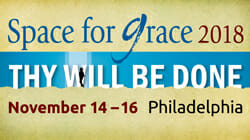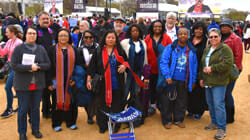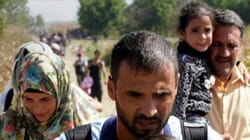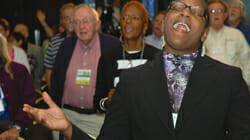Children of incarcerated parents find healing at ABHMS-sponsored camps
I want you to know that I pray for you,
and everything is going to be alright.
Be strong. God is in control.
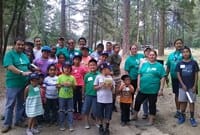 Nine-year-old Juan’s eyes filled with tears when he read those words written to him by Jerome, 13. Although the two don’t know each other, they share an understanding—each has a parent who is incarcerated, and both attended an American Baptist Home Mission Societies (ABHMS)-sponsored sleep-over camp for those experiencing the incarceration of a parent or relative.
Nine-year-old Juan’s eyes filled with tears when he read those words written to him by Jerome, 13. Although the two don’t know each other, they share an understanding—each has a parent who is incarcerated, and both attended an American Baptist Home Mission Societies (ABHMS)-sponsored sleep-over camp for those experiencing the incarceration of a parent or relative.
Juan received the encouraging note as one of 20 children aged 5-12 who attended the Stations of Hope Los Angeles Camp Aug. 13-15. Jerome wrote the note as one of approximately 23 children and youth aged 6-16 who attended Camp Moseley, Akron, Ohio, Aug. 3-7.
The names and ages of children at the Los Angeles camp were shared with children at the Ohio camp by the Rev. Fela Barrueto, national coordinator of ABHMS’ Prisoner Re-entry and Aftercare Ministry, who coordinated workshops at the Ohio camp and led the Los Angeles camp.
The note-writing activity made quite an impact, says Dr. Alicia Malone, who has not only been directing the Ohio camp for 14 years but is also founder of Bondage Breakers, a prisoner re-entry ministry in Akron; a member of ABHMS’ National Prisoner Re-entry Network; and vice president of student affairs at Tri-State Bible College North, Akron.
“I could hear the children talking, as they were engaged in writing” Malone says. “To see children sitting there and exercising their thought process and their level of love and compassion and writing notes to other children that they don’t know is a very touching moment. Some wrote: ‘We don’t know you, but we love you.’”
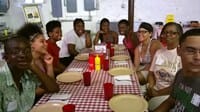 Another powerful exercise was that of climbing a 47-foot wall, paired with the study of Psalm 121:1-2: “I lift up my eyes to the hills—from where will my help come? My help comes from the Lord, who made heaven and earth” (NRSV).
Another powerful exercise was that of climbing a 47-foot wall, paired with the study of Psalm 121:1-2: “I lift up my eyes to the hills—from where will my help come? My help comes from the Lord, who made heaven and earth” (NRSV).
“We explained to the children that God is even higher than that wall. Sometimes we will have difficulties in life that seem insurmountable, but, at the end of the day, when you learn to trust God, all things then become very, very possible,” Malone says. “That was a real power punch because it attached the physical action to the description.”
The traditional marshmallow-roasting-and-singing-songs-by-the-campfire experience took on greater depth and meaning as the children and youth called upon the Holy Spirit, tossing into the fire pieces of paper on which they had jotted anything that was heavy on their hearts, including the names of people who had harmed them.
“We talked about God having the power to heal,” Barrueto recalls. “I could see the expressions on their faces at that moment when you leave those [negative] things and present them to God.”
Communing with nature was another important part of the camp’s healing experience.
“At the most rudimentary level, it gives children opportunity to come away from the inner-city dynamics, violence and hecticness that go on from day to day,” Malone says. “At night, in the city, you hear gunshots, traffic accidents and ambulances. It gives them the opportunity to get away from all the social-cultural madness and go into an area where you can feel the presence of God and that he owns the whole world, but he is certainly specifically here on these camp grounds.
“I’ve looked at some children and their eyes are so big,” she adds. “That part of the experience is physically undeniable healing.”
Other activities included swimming, horseback riding, basketball, crafts, talent shows, academic workshops, Bible study, morning devotions, worship and baptisms.
In addition to camp sponsorship via ABHMS, participants attended fee-free via a Matthew 25 Grant provided by American Baptist Churches USA.
Camp Moseley served as the model for the Stations of Hope Los Angeles Camp, a pilot program at which trainers were trained to duplicate the model in other parts of the United States.
Information is available online about ABHMS’ Prisoner Re-entry and Aftercare Ministry. For more information about ABHMS’ National Prisoner Re-entry Network, contact Barrueto at Fela.Barrueto@abhms.org.


